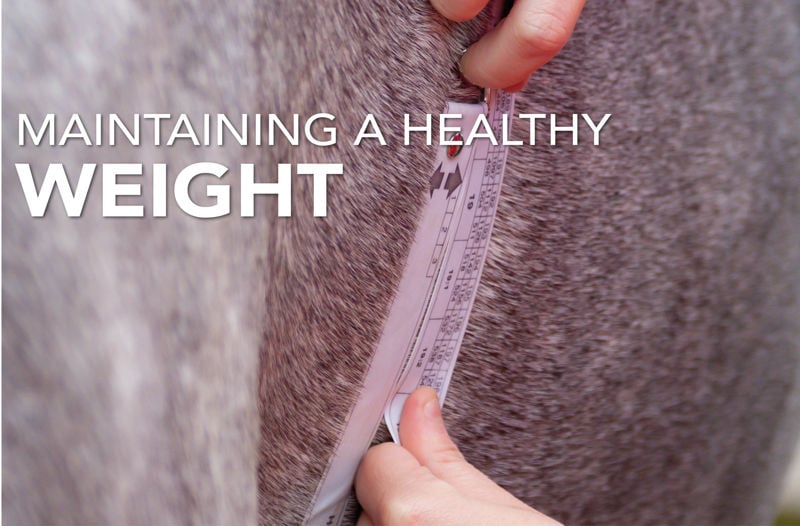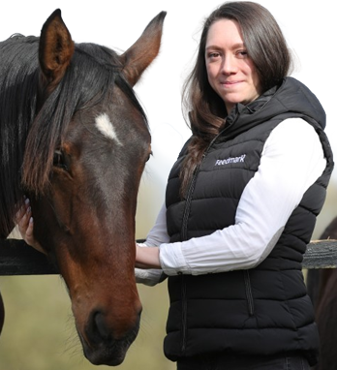How to tell if your horse is healthy weight
Being a ‘healthy weight’ is not a one size fits all term and will mean different things for each individual horse. The ideal weight for a horse depends on their current workload, the discipline they are used for and any health issues that they may be affected by.
To put this into context, a healthy weight for a 5* eventer at peak competition fitness is very different from that of a riding club level horse and therefore we must always look at the horse in front of us and consider body condition as well as body weight.
Whilst workload and health issues have a direct impact on a horse’s body weight, the time of year is an influencing factor as well. Naturally, the horse’s metabolism is geared up for them to gain weight in the spring and summer when there is a plentiful supply of forage and then for them to lose weight in the winter months when forage is scarce. However, human intervention and modern management practices have altered this cycle. Many horses are now overweight and spend all year in a calorie surplus, meaning that they are maintaining higher body weights year-round.
It is important to be the ‘owner’ of your horse’s diet, you are their only advocate in maintaining a healthy weight, and constantly assessing and readjusting their diet is a year-round requirement to help them maintain a healthy body condition.
The benefits of a horse maintaining a healthy weight
-
Reduces the wear and tear on joints your horse's joints.
-
Reduces risk of your horse developing metabolic issues.
-
Supports optimal fitness.
-
Reduces strain on your horse's organs i.e., heart and lungs.
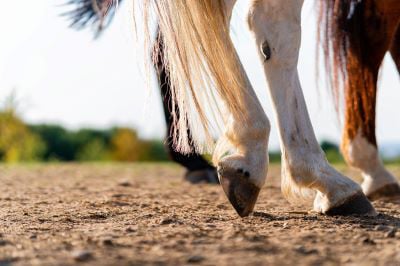
If your horse is over weight, it can place excess strain on their joints, muscles, and organs.
How to monitor your horse’s weight
Regular monitoring of your horse’s body weight will help you to keep track of any fluctuations and make appropriate changes when necessary, such as increasing or decreasing calorie intake and making changes to feed and forage.
The most accurate way to monitor body weight is on a horse weigh bridge, however, these are expensive to purchase as a horse owner. Some veterinary practices and big equestrian centres will have mobile weigh bridges and feed companies may also offer a weighbridge service.
If access to a weighbridge is not possible use of a weight tape is the next option. Weight tapes are not the most accurate way of determining your horse’s body weight as they are influenced by the horse’s confirmation, especially the depth of the horse’s torso, however, they are a great way of monitoring changes in weight i.e., loss or gain.
Using body condition scoring alongside weight taping will help you to understand about the distribution of fat and muscle your horse has. Body condition scoring is a hands-on approach that allows you to feel for fat pads/deposits and muscle tone. Fat feels spongy and muscle feels firm. Ideally, you want to body condition score and weigh your horse every two weeks. Any more frequently than this is too often and any longer than this can be harder for you to support your horse's weight loss or weight gain efficiently.
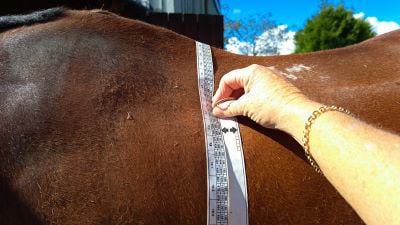
Weight tapes are not the most accurate way of determining your horse’s body weight
What to feed a horse your horse to maintain a healthy weight
Horses are herbivores and have evolved to digest huge quantities of fibre. It is this fibre that maintains a healthy digestive system and provides them with the energy they require for living.
The horse’s diet should consist of high levels of forage that is always available to them - they are trickle feeders and should spend around 16-18 hours per day eating.
Forage doesn’t provide the modern horse with a balanced diet (all the vitamins and minerals they require to maintain health and well-being). This is due to modern pasture management as we use monocultured species of grass in our pasture and hay/haylage and also because horses are not able to roam as they did before domestication.
It is important to provide a source of vitamins and minerals for the horse on a daily basis, all year round. Even though the quality of forage improves in the spring and summer, this is still deficient in important vitamins and minerals and will not provide a balanced diet. Vitamins and minerals come in lots of forms for example balancers, supplements, licks, and fully fortified hard feed (bagged feeds such as mixes and cubes).
Forage will provide a huge amount of energy and calories for the horse and should be the basis (majority portion) of all horse’s diets. Forage should be fed at around 2-2.5% of the horse's body weight daily however some horses will require more than this to help maintain weight and some horses will require less than this (although NEVER less than 1.5% of body weight) to help encourage weight loss if they are overweight.
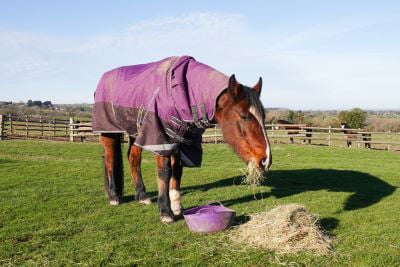
How to encourage weight gain for an under-weight horse
When dealing with an underweight horse, assessing their forage intake is the most important place to start. If they are not receiving enough forage they will not maintain a suitable weight and the risk of digestive issues greatly increases.
Other factors to consider are underlying health issues, workload, and dental health so get these checked before making dietary adjustments if you believe that their forage intake is adequate – and that they are eating it! Just because you are providing enough forage doesn’t necessarily mean that your horse will or is eating it so ensuring that they are consuming enough forage as well as being provided with enough is crucial.
If everything has been checked and any changes made and the horse is still struggling to maintain a suitable weight, adding additional calories from hard feed will be required. This can come in the form of high oil products which are calorie dense, highly digestible ‘super-fibres’, or from cereals. The type of feed that you choose will be influenced by the individual horse, their age, workload, and any health issues. Speak to an equine nutritionist who will be able to give you guidance.
Some horses will maintain weight well over the spring and summer but lose too much in the winter. These horses will need different feeding plans year-round to help maintain an optimal body weight. Other horses will always struggle with their weight – poor doers and will need year-round support to maintain correct body weight.
How to support necessary weight loss for your horse
Some horses maintain weight very easily and are classed as good doers. Maintaining a healthy weight for these horses can be a constant struggle. Good doers are unlikely to require ad-lib access to forage as this could provide too many calories for them. Instead, these horses will need restricted rations however it is important to implement feeding regimes that prolong the intake of their forage rations to ensure that they are not going for long periods of time without forage to eat as this can increase the risk of digestive issues. Using slow feeders, trickle nets, and hay balls for example can elongate feeding times.
Good doers are unlikely to require any additional feed (except for vitamins and minerals) so will more than likely be fed a balancer or vitamin and mineral supplement. There will be times when workload demands require a higher level of energy to be provided by the diet however as energy and calories are the same thing, seeking professional advice will help to ensure your horse is still getting an adequate energy intake to support correct weight maintenance but to also support necessary energy requirements for the work they are doing.
You can learn more about feeding a good-doer here>
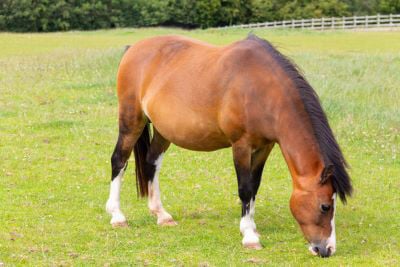
Maintaining a healthy weight of a good-doer can be a struggle
Summary
All horses are individuals and therefore this is a generalised view on managing weight in horses. The best practice is to consult with an equine nutritionist who will be able to help you come up with an appropriate diet plan for your horse. You don’t have to have a top-level competition horse to contact a nutritionist they will provide support to all horses from those not in work, through to top-level competition and anything in between, and will help to navigate feeding practices for horses with health issues who may require specialist diets.
If you would like any advice, please contact our Equine Nutrition Team who would be happy to help you. You can email [email protected] or call our freephone advice line on 0800 585525.


